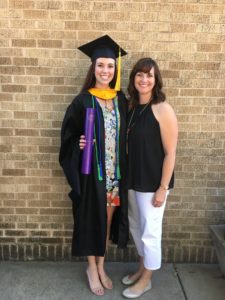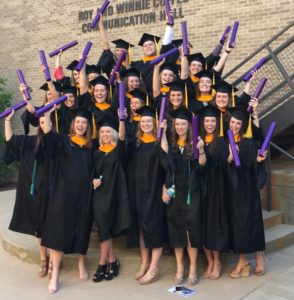When my oldest daughter was a few weeks shy of graduating high school she casually mentioned over dinner with friends that she’d decided to major in speech pathology. I just about fell out of my chair.
All her life she had wanted to be a teacher. This was the girl who’d bossed her younger siblings into playing school all through elementary. Her American Girl doll had all the school supplies the franchise ever made. She even asked for an overhead projector for Christmas when she was in 5th grade. I mean she wasn’t messing around.
Teaching was her dream. Until it wasn’t. Yet sort of still was.



After six long years, this past May delivered both her master’s degree and a job as a school-based speech pathologist.
It has been the most beautiful surprise blessing to share a career with her. Now and forever will the eyes of our family glaze over when talk between us eventually turns ad nauseam to apraxia and autism and assessments. Her passion and excitement for this wonderful field of study have given me fresh wind for it as well.
Right now she is deep into the drinking-from-a-firehose stage of her clinical fellowship. Do you remember what that was like? What an intense and overwhelming season especially when you feel like everyone is suddenly looking for you to be the know-everything-professional in the room.
A few weeks ago we talked and she said something I thought was a valuable statement to remember. She is rehearsing this saying, over and over:
“That is a good question. I don’t have the answer for you right now, but give me some time and I will find the answer for you!”
A wise practice indeed.
I know I’ve been guilty of avoiding this kind of honesty. There have been times in meetings or discussions with coworkers when I felt it better to bluff my way through than admit I didn’t know what the heck I was talking about. BS is what you call that and I’m pretty sure everyone in the room could smell it.
I think we’ve all been in situations when we’ve spoken before having solid answers. We’ve responded when our guts should have warned us not to. We’ve allowed fear or insecurity or pride to indirectly lie to ourselves and others.
We can’t bear sounding amateurish.
In reality, the most professional thing we can do is admit that we don’t have the answer.
Not that we should stop there, of course. We do research, we problem solve, we ask a supervisor or colleague. And then we follow up. It can be hard and time-consuming, but it’s the best way to grow.
I’m afraid we are sometimes tempted to sacrifice our integrity on the altar of easy quick answers. We want to save face more that than we want to be honest, with ourselves and others.
But don’t you feel more comfortable with someone who admits they don’t have all the answers than one who pretends to be a know it all? I’ve found that the simple language of “I don’t know” delivers deeper authenticity, breeding connection and trust.
So to all the brand new clinicians out there, don’t be afraid to admit when you don’t know something. Press into a wisdom born of humility that asks questions, seeks answers and admits mistakes.
And to those out there who’ve been around the block a time or two, myself included, may there never come a day when we fall asleep believing we’ve got all the answers.
If you have a few extra minutes, check out this Ted Talk from Peter Bregman who speaks directly to the wisdom of saying “I don’t know”.
One side of ‘I don’t know’ is incredibly scary and vulnerable. The other side is that every creative and innovative idea comes out of ‘I don’t know’….You have to have tremendous confidence, tremendous self-esteem, tremendous strength to not know something.”
Why does admitting we don’t have an answer feel so vulnerable?
